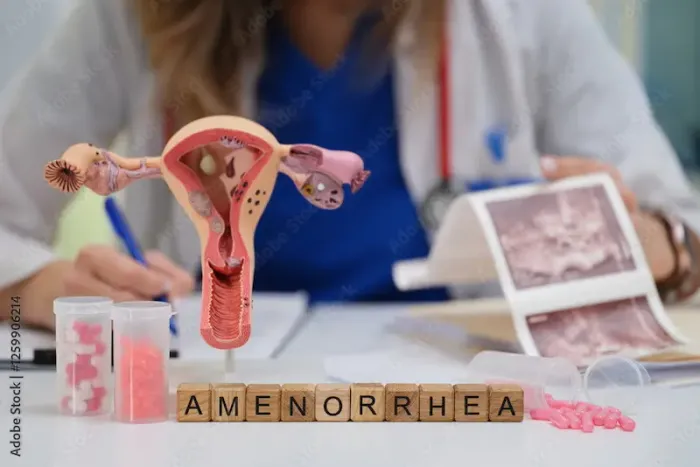Amenorrhea Symptoms, Causes, and Treatment Options
Know all about amenorrhoea, what it is, causes, symptoms, how it affects the health, diagnosis and treatment options. Learn about the prevention of amenorrhoea and more.


Introduction
Amenorrhea is a medical condition where a woman of reproductive age misses her menstrual periods. While it is normal during pregnancy, breastfeeding, or menopause, missing periods at other times may indicate an underlying health issue. If you or someone you know is experiencing amenorrhea, understanding its symptoms, causes, and treatment options can help in managing the condition effectively.
What is Amenorrhea?
Amenorrhea is the absence of menstrual periods in women who:
• Have not started menstruating by age 15 (primary amenorrhea).
• Have missed three or more consecutive periods after previously having regular cycles (secondary amenorrhea).
While occasional missed periods can happen due to stress or lifestyle changes, persistent amenorrhea should be evaluated by a doctor.
Consult a Gynaecologist for Personalised Advice
Symptoms of Amenorrhea
The main symptom is the absence of periods, but depending on the cause, other signs may include:
• Headaches or vision changes (could indicate a pituitary gland issue).
• Milky nipple discharge (galactorrhea, possibly due to hormonal imbalance).
• Excessive hair growth on the face and body (hirsutism, linked to PCOS).
• Pelvic pain (if structural issues like blocked reproductive organs are present).
• Hot flashes, night sweats, or vaginal dryness (could suggest early menopause).
• Weight changes, fatigue, or hair loss (may be due to thyroid or nutritional issues).
If you experience these symptoms along with missed periods, consult a doctor for proper evaluation.
Common Causes of Amenorrhea
Amenorrhea can result from various factors, including hormonal imbalances, structural problems, or lifestyle influences.
1. Primary Amenorrhea Causes
• Genetic or chromosomal abnormalities (e.g., Turner syndrome).
• Structural issues (e.g., missing uterus or blocked vagina).
• Hormonal disorders affecting the pituitary gland or hypothalamus.
2. Secondary Amenorrhea Causes
• Pregnancy (the most common reason for missed periods).
• Breastfeeding (lactational amenorrhea).
• Polycystic Ovary Syndrome (PCOS) – A hormonal disorder causing irregular periods.
• Thyroid disorders (hypothyroidism or hyperthyroidism).
• Premature ovarian failure (early menopause) – When the ovaries stop functioning before age 40.
• Excessive exercise or low body weight – Common in athletes or women with eating disorders.
• Chronic stress – Affects hormone regulation.
• Certain medications (e.g., birth control pills, chemotherapy, antipsychotics).
How Amenorrhea Affects Health
While missing periods may not always be harmful, untreated amenorrhea can lead to complications, such as:
• Infertility – Without ovulation, pregnancy becomes difficult.
• Osteoporosis – Low estrogen weakens bones, increasing fracture risk.
• Cardiovascular issues – Hormonal imbalances may affect heart health.
• Emotional distress – Anxiety about fertility or underlying conditions.
Diagnosis and Treatment Options
If you have amenorrhea, your doctor may recommend:
• Blood tests (to check hormone levels, thyroid function, or pregnancy).
• Pelvic ultrasound (to detect structural abnormalities).
• MRI or CT scan (if a pituitary tumour is suspected).
Treatment Depends on the Cause
Types of treatment include:
• Hormonal therapy (for PCOS, thyroid disorders, or estrogen deficiency).
• Lifestyle changes (weight management, stress reduction, balanced diet).
• Fertility treatments (if pregnancy is desired).
• Surgery (for structural blockages or tumours).
Tips for Managing Amenorrhea
Tips for managing amenorrhoea:
1. Maintain a Healthy Weight – Extreme weight loss or obesity can disrupt periods.
2. Eat a Balanced Diet – Include iron, calcium, and healthy fats to support hormonal health.
3. Exercise Moderately – Avoid excessive workouts that strain the body.
4. Manage Stress – Practice yoga, meditation, or deep breathing.
5. Track Your Cycle – Use a period tracker to monitor irregularities.
When to See a Doctor?
Consult a healthcare provider if:
• You haven’t started menstruating by age 15.
• You miss three or more periods in a row.
• You experience other symptoms like hair growth, headaches, or pelvic pain.
Final Thoughts
Amenorrhea is often manageable with the right medical guidance and lifestyle adjustments. If you’re experiencing irregular or absent periods, don’t ignore it; seek professional advice to ensure long-term well-being.
Consult a Gynaecologist for Personalised Advice
Consult a Gynaecologist for Personalised Advice

Dr. Mona Yadav
Obstetrician and Gynaecologist
19 Years • MBBS, MD (Obstetrics & Gynaecology)
Dombivli
Nulife multispeciality, Dombivli

Dr. Parul Sharma
Obstetrician and Gynaecologist
8 Years • MBBS, MS (Obstetrics & Gynaecology)
New Delhi
THE DOCTORS NESST, New Delhi

Dr. Asha Rani Singh
Obstetrician and Gynaecologist
24 Years • MBBS DGO
Delhi
Dr Asha Rani Singh Clinic, Delhi

Dr. Shyamala Devi
Obstetrician and Gynaecologist
38 Years • MBBS, MS Obstetrics & Gynaecology
Vijayawada
Sri Shivshakti Nilayam, Vijayawada
Dr Srigiri Mamatha Reddy
Obstetrician and Gynaecologist
0 Years • MBBS, MS Obstetrics and Gynaecology
Hyderabad
Apollo 24|7 Clinic - Telangana, Hyderabad
Consult a Gynaecologist for Personalised Advice

Dr. Mona Yadav
Obstetrician and Gynaecologist
19 Years • MBBS, MD (Obstetrics & Gynaecology)
Dombivli
Nulife multispeciality, Dombivli

Dr. Parul Sharma
Obstetrician and Gynaecologist
8 Years • MBBS, MS (Obstetrics & Gynaecology)
New Delhi
THE DOCTORS NESST, New Delhi

Dr. Asha Rani Singh
Obstetrician and Gynaecologist
24 Years • MBBS DGO
Delhi
Dr Asha Rani Singh Clinic, Delhi

Dr. Shyamala Devi
Obstetrician and Gynaecologist
38 Years • MBBS, MS Obstetrics & Gynaecology
Vijayawada
Sri Shivshakti Nilayam, Vijayawada
Dr Srigiri Mamatha Reddy
Obstetrician and Gynaecologist
0 Years • MBBS, MS Obstetrics and Gynaecology
Hyderabad
Apollo 24|7 Clinic - Telangana, Hyderabad


